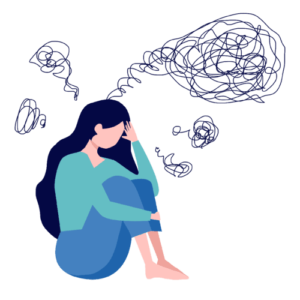
Mental Contamination OCD Assessment
Answer these simple questions to understand more about Mental Contamination OCD Assessment. We share instant results and keep your information confidential.

What is Mental Contamination OCD Assessment?
Mental Contamination OCD involves intrusive, distressing thoughts or feelings of being “contaminated” by thoughts, emotions, or concepts rather than physical substances. An assessment for this OCD subtype typically involves evaluating the individual’s reaction to triggers, the intensity of anxiety or distress experienced, the extent of avoidance behaviors, and the impact on daily life. Clinicians use standardized questionnaires, interviews, and clinical observation to diagnose and understand the severity of mental contamination symptoms. This assessment helps tailor appropriate treatments, often involving Exposure and Response Prevention therapy, to reduce distress and enhance the individual’s ability to manage and cope with these obsessions.
Who can benefit from this Mental Contamination OCD Assessment?
The Mental Contamination OCD Assessment can benefit individuals who suspect they are struggling with mental contamination-related obsessive-compulsive disorder (OCD). This assessment provides a structured framework to evaluate the severity of mental contamination symptoms, including distressing feelings of being “contaminated” by thoughts, emotions, or memories. People experiencing intrusive and distressing thoughts or feelings that lead to avoidance behaviors, emotional distress, and impaired daily functioning can benefit from this assessment. It helps individuals gain insight into their symptoms, facilitating informed discussions with mental health professionals and guiding appropriate treatment strategies tailored to their specific needs.


Mental Contamination OCD Assessment Accuracy
Assessing mental contamination OCD accurately requires a comprehensive evaluation by a mental health professional. This involves assessing symptoms, triggers, distress levels, and the impact on daily life. Accurate diagnosis relies on understanding if intrusive feelings of contamination arise from internal sources (thoughts, memories) rather than external ones. Collaborating with an experienced clinician ensures a precise diagnosis and development of an effective treatment plan, often involving exposure therapy and cognitive restructuring. Self-assessment might provide insights, but professional evaluation is crucial due to the complexity and potential comorbidities of mental contamination OCD.
Types of Mental Contamination OCD Assessment
Clinical Interview:
The mental health professional will conduct a comprehensive interview to gather information about the individual’s symptoms, history, triggers, and their impact on daily life.
Duration and Intensity:
Determine how long the individual has been experiencing these symptoms and how severe they are. Assess whether the symptoms interfere with daily functioning, relationships, and overall quality of life.
Physical and Behavioral Responses:
Explore whether the person engages in any physical or behavioral rituals (compulsions) to alleviate the distress caused by the mental contamination. These could include mental rituals, avoidance behaviors, or other coping mechanisms.
Safety Behaviors:
Explore any safety behaviors that the person might engage in to prevent or manage the distress caused by mental contamination. Safety behaviors might provide temporary relief but can perpetuate the OCD cycle.
Thought Patterns:
Investigate the individual’s thought patterns, such as cognitive distortions or irrational beliefs related to mental contamination. These distorted thoughts contribute to the obsessions and distress.
Comorbidity:
Assess whether there are other coexisting mental health conditions, such as anxiety disorders, depression, or other types of OCD subtypes.
Handling Mental Contamination OCD Issues
Mental contamination OCD, a subtype of Obsessive-Compulsive Disorder (OCD), involves experiencing intense feelings of dirtiness, contamination, or moral impurity without any actual physical contact. Managing mental contamination OCD can be challenging, but there are strategies that can help you cope with these issues. Keep in mind that seeking professional help from a therapist experienced in treating OCD is essential for effective management. Here are some strategies to consider:
- Exposure and Response Prevention (ERP) Therapy: ERP is a gold-standard treatment for OCD, including mental contamination. In ERP, you gradually expose yourself to situations that trigger your obsessions (e.g., thoughts of contamination) while refraining from performing compulsions (e.g., mental rituals, avoidance). This process helps desensitize the anxiety associated with your obsessions.
- Identify Triggers: Become aware of situations, thoughts, or emotions that trigger your feelings of mental contamination. Understanding your triggers can help you better prepare for exposure exercises.
- Practice Mindfulness: Mindfulness techniques can help you observe your thoughts without judgment and reduce the distress associated with mental contamination obsessions. Mindfulness can also provide a sense of distance from these distressing thoughts.
- Challenge Cognitive Distortions: Work with a therapist to challenge distorted thoughts related to mental contamination. These thoughts often involve black-and-white thinking, catastrophizing, and overgeneralization.
- Imaginal Exposure: Gradually expose yourself to mental contamination scenarios using your imagination. Work with your therapist to create a hierarchy of exposure exercises that gradually increase in difficulty.
- Delay Rituals: If you find yourself engaging in mental rituals to neutralize the discomfort of mental contamination obsessions, try delaying those rituals. Over time, you can extend the delay period and reduce the impact of these compulsions.
- Accept Uncertainty: One of the core principles of ERP is learning to tolerate uncertainty. Recognize that you cannot control every thought or outcome, and that uncertainty is a natural part of life.
- Physical Exposure: In some cases, combining mental exposure with controlled physical exposure can be effective. For example, exposing yourself to mild dirt or contaminants and resisting the urge to wash immediately.
- Self-Care: Engage in activities that promote relaxation and well-being. Regular exercise, proper sleep, and a healthy diet can have positive effects on your mental health.
- Support System: Communicate with friends and family about your struggles so they can provide emotional support. Education about your condition can also help them understand what you’re going through.
- Journaling: Keep a journal to document your progress, including your exposure exercises and how you responded to them. This can help you track your achievements and identify patterns.
- Celebrate Successes: Acknowledge and celebrate your achievements, no matter how small. Overcoming mental contamination OCD is a step-by-step process, and each victory counts.
Remember that seeking professional help is crucial for effectively managing mental contamination OCD. A therapist can guide you through exposure exercises, provide support, and tailor strategies to your specific needs.